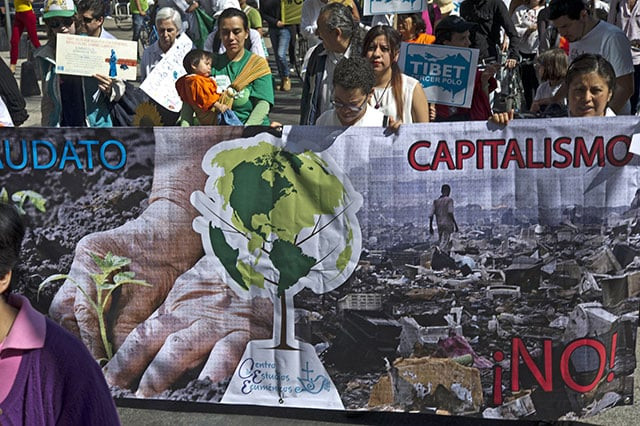In trench war over climate text, a little means a lot
Negotiators in Paris poring over labyrinthine draft to save humanity from a climate catastrophe

Negotiators in Paris poring over labyrinthine draft to save humanity from a climate catastrophe. PHOTO: AFP
Negotiators gathered in Paris are trying to craft an historic global deal by December 11 to save humanity from a feared climate catastrophe.
Paris human chain gives emotional jolt to climate summit
But in front of them is a 54-page draft of mind-wrenching complexity. It has been described as the most complicated international agreement ever attempted, committing every nation to roll back carbon gases that trap the Sun’s heat around the Earth.
The post-2020 pact has far-reaching consequences for all, from low-lying islands that risk being swamped by rising seas to poor nations that demand the right to power their way to wealth. With stakes so high, every word counts.
So, in the draft deal, for example, negotiators have to decide whether to use the word ‘shall’, which is mandatory, or ‘should’, which is just a guideline. It is a choice that comes up not once, not twice, but 34 times.
Nawaz, Modi shake hands during climate summit in Paris
It is a tradition that whenever there is a disagreement over the wording of proposed international accords, the disputed text is placed in brackets for participants to make a decision later. Such are the divisions over the climate pact that the text has become an almost laughingly turgid tangle.

“(Each Party)(All Parties) (recognising the principle of common but differentiated responsiblities and respective capabilities) (shall)(should)(other) regularly (formulate)(prepare), (communicate)(submit)(maintain)(update) and (shall)(should)(other) (implement)(fulfill) (intended)(nationally determined mitigation (commitments)(contributions)(actions),” reads one choice section.
An attempt had been made by conference organisers in Bonn, Germany, in October to reduce the draft agreement to a simpler 20 pages. But then negotiators were asked for their reaction, and the draft mushroomed back to more than 50 pages, with many of the options that had been deleted re-inserted.
Protesters push leaders to avert climate catastrophe
“The core operative provisions and central variables remain hotly contested,” a group of legal experts complained in an analysis, Deconstructing Paris. “The specific greenhouse-gas stabilisation target, its timeframe and the national mitigation/adaptation contributions are all unresolved. If anything, these sections are harder to follow than the previous drafts.”
The goal of the agreement is to curb the planet’s temperature rise to below, or well below, 1.5 or 2.0 degrees Celsius above pre-Industrial Revolution levels. In the long term, it could aim for removing fossil fuel burning from the economy by 2050, or by 2070, or by 2100. With such an ambitious goal, it’s no surprise there are so many disputes, and the document is so wordy.
But the legal experts say there is nevertheless a gaping hole.
“Studies have shown that 82% of today’s fossil fuel reserves must remain in the ground to avoid 2 degrees of warming,” Deconstructing Paris said.
Pakistan to argue its case at Paris summit
Despite this straightforward logic, the legal team said, there is no reference in the draft agreement to reducing international support for fossil fuels. “This continued omission implies that it has been considered politically unrealistic to tackle climate change by directly considering fossil fuel production.”
Like a game of three-dimensional chess, the fight over text is taking place at several levels. Member states have set up a working group of 80 heads of delegations from around the world to pore over the document, said a source close to the French team. Negotiators have been tasked to hold mini-meetings over each point and to report back and say “if it has been resolved.”
Beyond the centralised ‘contact’ group, there are ‘spinoff’ groups, which meet separately on thematic issues, such as reducing carbon emissions and helping countries adapt to climate change.
Then there are informal groups within informal groups that seek to thrash out issues among a small cluster of nations at odds.
Published in The Express Tribune, December 2nd, 2015.



1725254039-0/Untitled-design-(24)1725254039-0-208x130.webp)















COMMENTS
Comments are moderated and generally will be posted if they are on-topic and not abusive.
For more information, please see our Comments FAQ